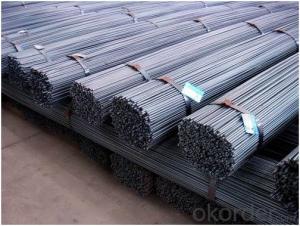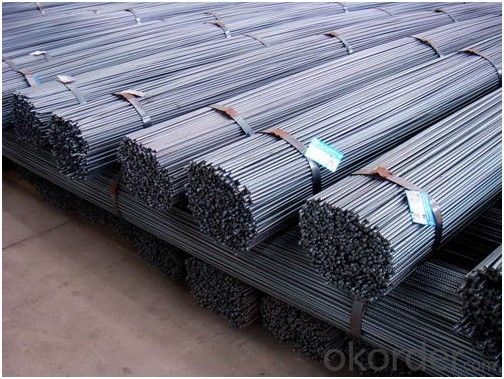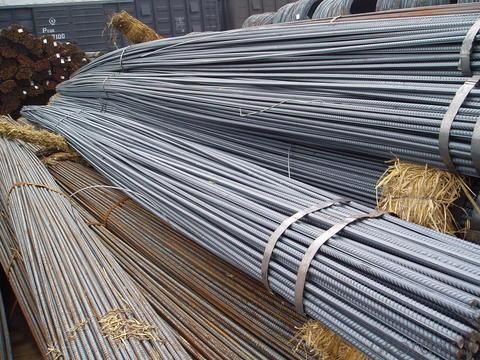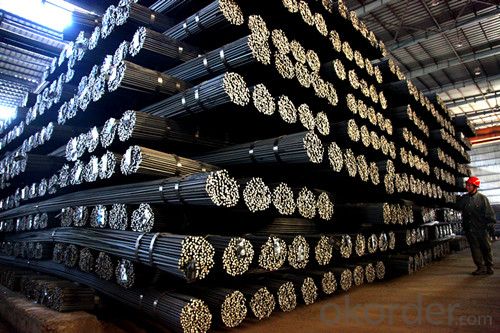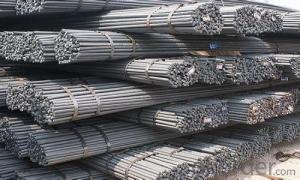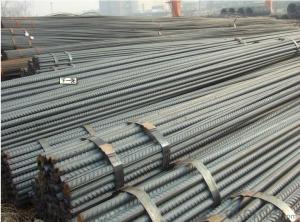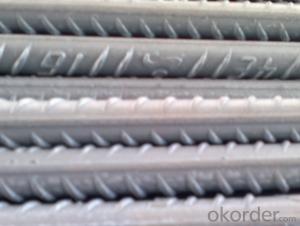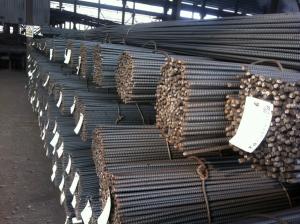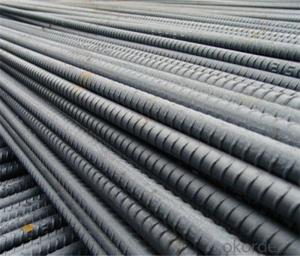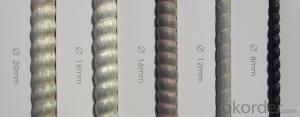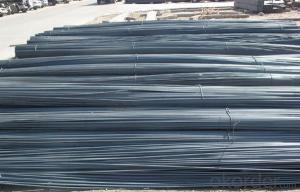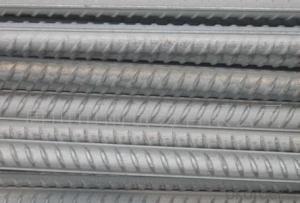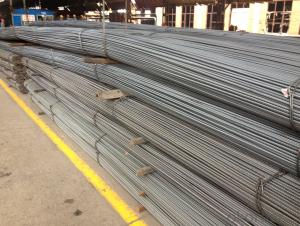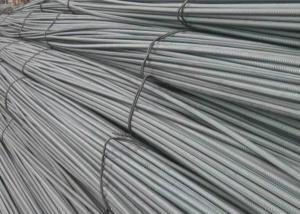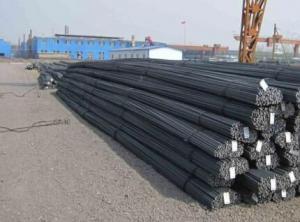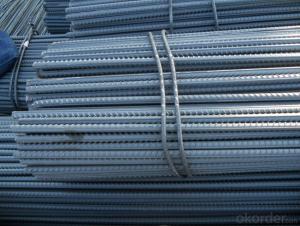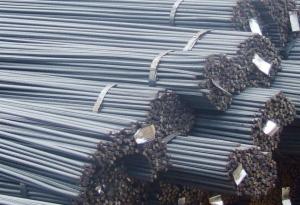Deformed Bars/ Reinforcing Steel Bars/ Rebar for Construction from China Professional Manufacturer
- Loading Port:
- Tianjin
- Payment Terms:
- TT or LC
- Min Order Qty:
- 30 m.t.
- Supply Capability:
- 40000 m.t./month
OKorder Service Pledge
OKorder Financial Service
You Might Also Like
Product Specifications of Deformed Bars/ Reinforcing Steel Bars/ Rebar for Construction from China Professional Manufacturer
1. reinforcing steel bar
2.diameter:6mm-40mm
3.length:3.5m-12m or as customized
4.certificate:ISO9001:2008,ISO14001:2004
Produt Size and Materials of Deformed Bars/ Reinforcing Steel Bars/ Rebar for Construction from China Professional Manufacturer:
(1)6mm-40mm rebar
(2)12mm-300mm round bar
(3)0.40-1.2mm*1000-1250mm*C electro galvanized steel coil
(4)0.16-1.0mm*900-1250mm*C prepainted galvanized steel coil
(5)0.15-2.0mm*900-1250mm*C hot dipped galvanized steel coil and aluzinc steel coil
(6)0.3-2.0mm*400-1400mm*C cold rolled steel coil
(7)0.80mm-2.0mm mig welding wire
The products exported to Korea, Japan and Southeast Asia, and have a good reputation.
Luli Steel Co., Ltd warmly welcomes all the customers to come to discuss the cooperation and seek common development.
If any questions and need steel information,pls feel free to contact me.
Theorectical Weight Index of Deformed Bars/ Reinforcing Steel Bars/ Rebar for Construction from China Professional Manufacturer:
Diameter (MM) | Inner Diameter (mm) | Rib height (mm) | Cross Sectional Area (MM²) | Theorectical Weight (KG/M) |
6 | 5.8 | 0.6 | 28.27 | 0.222 |
8 | 7.7 | 0.8 | 50.27 | 0.395 |
10 | 9.6 | 1.0 | 78.54 | 0.617 |
12 | 11.5 | 1.2 | 113.1 | 0.888 |
14 | 13.4 | 1.4 | 153.9 | 1.21 |
16 | 15.4 | 1.5 | 201.1 | 1.58 |
18 | 17.3 | 1.6 | 254.5 | 2 |
20 | 19.3 | 1.7 | 314.2 | 2.47 |
22 | 21.3 | 1.9 | 380.1 | 2.98 |
25 | 24.2 | 2.1 | 490.9 | 3.85 |
28 | 27.2 | 2.2 | 615.8 | 4.83 |
32 | 31.0 | 2.4 | 804.2 | 6.31 |
36 | 35.0 | 2.6 | 1018 | 7.99 |
40 | 38.7 | 2.9 | 1257 | 9.86 |
standard and grade of Deformed Bars/ Reinforcing Steel Bars/ Rebar for Construction from China Professional Manufacturer
ASTM | BS | JIS | GB |
A615 | BS4449 | G3112 | HRB |
Gr40/60/75 | Gr460, B500 | SD390 | 335/400/500 |
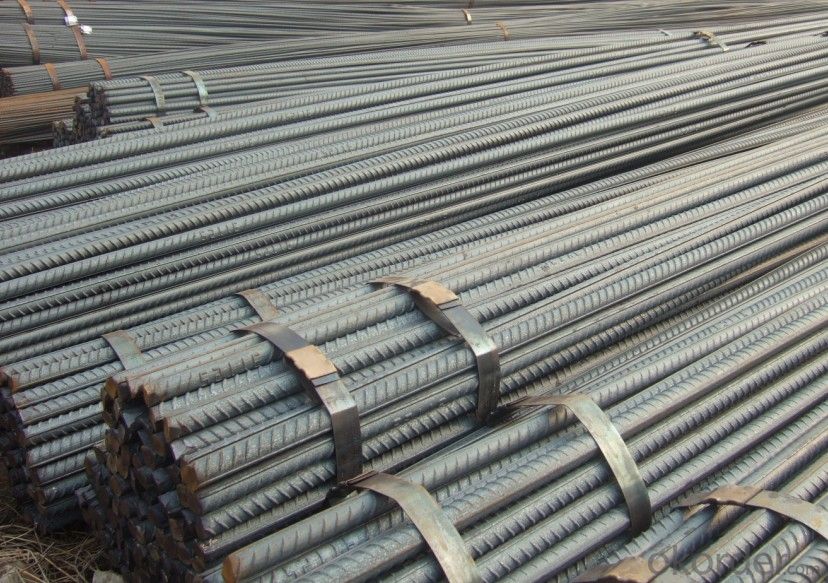
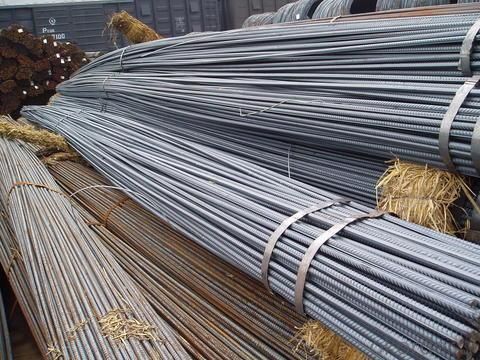
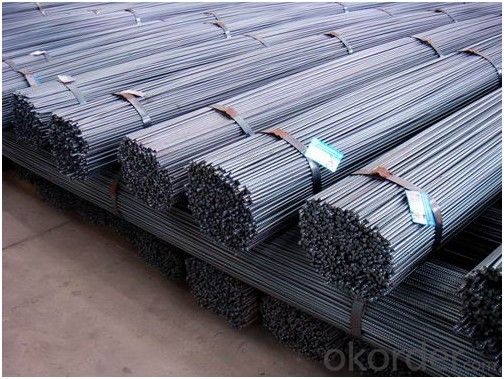
- Q: What are the guidelines for proper storage and transportation of steel rebars?
- The guidelines for proper storage and transportation of steel rebars include keeping them off the ground to avoid moisture and corrosion, storing them in a well-ventilated area, organizing them in a neat and stable manner to prevent falling or shifting, protecting them from direct exposure to weather conditions, and securing them properly during transportation to avoid damage or accidents.
- Q: What is the thermal expansion coefficient of steel rebars?
- In construction projects, it is crucial to take into account the thermal expansion coefficient of steel rebars to avoid potential problems caused by temperature changes. The coefficient refers to the speed at which the rebars expand or contract. Steel is recognized for its relatively low thermal expansion coefficient, which typically measures around 12 x 10^-6 per degree Celsius. This indicates that with each degree rise in temperature, the length of the steel rebar will expand by roughly 0.000012 times its original length. By considering this factor, we can prevent issues like structural instability and cracking resulting from temperature fluctuations.
- Q: What are the different types of coatings available for steel rebars to prevent corrosion?
- There are several types of coatings available for steel rebars to prevent corrosion. These coatings are designed to provide a protective barrier between the steel rebar and the surrounding environment, thereby preventing or minimizing the corrosion process. The different types of coatings include: 1. Epoxy Coating: This is a commonly used coating for steel rebars. It is a thermosetting polymer that forms a strong and durable protective layer. Epoxy coatings are known for their excellent resistance to chemicals and abrasion. 2. Zinc Coating: Zinc coatings, such as hot-dip galvanization, are widely used to protect steel rebars from corrosion. The zinc layer acts as a sacrificial anode, meaning it corrodes instead of the steel rebar, protecting it from oxidation. 3. Fusion-Bonded Epoxy Coating: This coating involves melting epoxy powder onto the steel rebar's surface, creating a strong bond. Fusion-bonded epoxy coatings are resistant to corrosion, chemicals, and moisture. 4. Polymer Coating: Polymer coatings, such as polyethylene or polypropylene, provide a protective layer against corrosion. These coatings are highly resistant to chemicals, abrasion, and moisture, ensuring long-term protection for the steel rebar. 5. Concrete Coating: Concrete can act as a protective coating for steel rebars when it is properly applied. The alkaline environment of concrete helps to passivate the steel rebar, forming a protective oxide layer that prevents further corrosion. 6. Stainless Steel Coating: Applying a thin layer of stainless steel onto the steel rebar's surface can significantly enhance its corrosion resistance. Stainless steel coatings offer excellent durability and resistance to harsh environments. It is important to choose the appropriate coating based on the specific application and environmental conditions to ensure optimal protection against corrosion for steel rebars.
- Q: Are there any disadvantages to using steel rebars?
- Yes, there are some disadvantages to using steel rebars. Firstly, steel rebars can corrode over time, especially in environments with high moisture or exposure to chemicals, which can reduce their strength and durability. Additionally, steel rebars are susceptible to thermal expansion and contraction, leading to cracking in concrete structures. Moreover, steel rebars are heavy and can be challenging to handle and transport, making construction processes more labor-intensive.
- Q: How are steel rebars protected against rust or corrosion?
- Steel rebars are protected against rust or corrosion through a process called corrosion protection, which involves either applying a protective coating or using corrosion-resistant materials such as stainless steel.
- Q: Is the finish steel 3 grade steel?
- The finish rolling thread steel is not 3 grade steel, and the 3 grade finish rolling thread steel is common thread steel.
- Q: Why is the price of screw steel affected by iron ore and coal?
- At the same time, rebar is the largest type of steel in our country and is the seller's market.
- Q: Can steel rebars be used in structures with high sulfate content in soil or water?
- Steel rebars should not be used in structures with high sulfate content in soil or water. Sulfates react with steel, especially with the iron present in the steel rebars, causing corrosion and weakening the structure. This process, known as sulfide attack or sulfate attack, can lead to the deterioration of the rebars and ultimately compromise the integrity of the entire structure. Therefore, alternative materials such as stainless steel rebars or non-metallic reinforcement like fiber-reinforced polymers (FRP) should be considered in such environments to ensure the longevity and safety of the structure.
- Q: What are the safety precautions to take when working with steel rebars?
- When working with steel rebars, it is important to follow several safety precautions. First, always wear appropriate personal protective equipment such as gloves, safety glasses, and steel-toed boots to protect yourself from potential injuries. Additionally, ensure that the work area is well-lit and free from any obstructions or tripping hazards. It is crucial to handle rebars with care to prevent cuts or punctures, so use proper lifting techniques and avoid dragging or sliding them. When cutting or bending rebars, use appropriate tools and always wear a face shield to protect against flying debris. Finally, be aware of the potential for falling rebars and use proper storage methods to prevent accidents.
- Q: How do steel rebars affect the overall sustainability of bridge constructions?
- Steel rebars play a crucial role in enhancing the overall sustainability of bridge constructions. By reinforcing the concrete structure, steel rebars improve the durability and strength of the bridge, allowing it to withstand heavy loads and harsh environmental conditions for an extended period. This increased lifespan reduces the need for frequent repairs or replacements, thereby minimizing resource consumption and waste generation. Additionally, steel rebars can be recycled at the end of their life cycle, reducing the environmental impact associated with their production. Hence, the use of steel rebars contributes to the long-term sustainability of bridge constructions.
Send your message to us
Deformed Bars/ Reinforcing Steel Bars/ Rebar for Construction from China Professional Manufacturer
- Loading Port:
- Tianjin
- Payment Terms:
- TT or LC
- Min Order Qty:
- 30 m.t.
- Supply Capability:
- 40000 m.t./month
OKorder Service Pledge
OKorder Financial Service
Similar products
Hot products
Hot Searches
Related keywords
